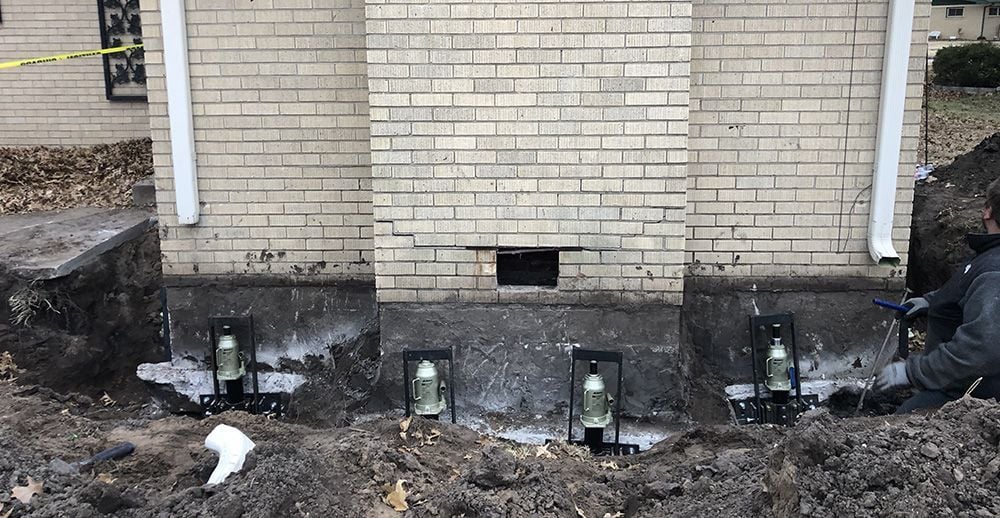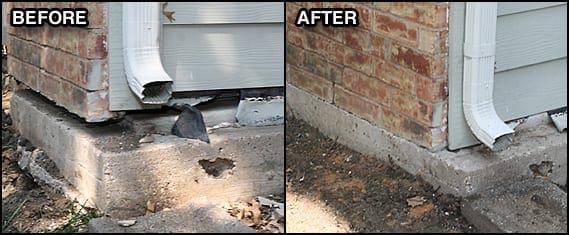The Benefits of Normal Examinations for Foundation Repair and Long-Term Security
Regular examinations for foundation repair work are important for maintaining the structural stability of a home. They help determine small concerns before they escalate right into substantial problems. Home owners frequently overlook the influence of these examinations on long-lasting security and safety. By understanding the advantages of regular exams, it ends up being clear how proactive steps can affect residential or commercial property worth. Numerous still take too lightly the significance of a solid foundation. What variables should be thought about when evaluating foundation wellness?
Comprehending the Value of a Strong Foundation
Typically forgotten, a strong foundation is crucial for the stability and long life of any kind of framework. It functions as the bedrock whereupon structures, bridges, and other infrastructures are put up, ensuring their capacity to withstand environmental anxieties. A well-constructed foundation distributes weight uniformly, preventing unequal settling and reducing the threat of structural damage with time.
A solid foundation secures against exterior elements such as wetness, pests, and soil movement, which can compromise structural stability. By purchasing robust foundation layout and building, homeowner can stay clear of pricey repair services and boost the overall safety and security of their structures.
Normal examinations additionally play an essential duty in maintaining foundation health, enabling early detection of potential issues. Ultimately, understanding the importance of a solid foundation fosters a proactive method to building and maintenance, making sure that frameworks stay safe and useful for years to come.
Usual Indicators of Foundation Issues
Determining usual indicators of foundation problems is vital for home owners and building supervisors alike. These signs can differ but frequently include noticeable cracks in wall surfaces, floors, or ceilings, which may suggest changing or settling. Doors and home windows that stick or fall short to shut correctly may also signal underlying foundation troubles. Furthermore, spaces in between walls and ceilings or irregular floorings can be indicators of instability. Homeowners might discover water merging in specific locations of the building, suggesting drainage concerns that might affect the foundation's stability. Exterior and interior wall bulging can better suggest architectural worries. A mildewy odor or mold development may recommend moisture breach connected to foundation problems. Identifying these indications without delay enables timely interventions, potentially decreasing costly repair services and guaranteeing the long-lasting stability of the building.

The Duty of Routine Assessments in Very Early Detection
Routine inspections play a vital duty in the early discovery of foundation issues, allowing house owners to attend to prospective problems before they rise. By regularly reviewing the condition of a structure, experts can recognize subtle signs of distress, such as small fractures, irregular settling, or wetness invasion. These very early indicators commonly serve as forerunners to much more severe architectural complications if left unattended.
Professional assessors use specialized tools and strategies to analyze foundation honesty extensively, guaranteeing that any arising worries are recorded and kept an eye on. This positive approach not only help in keeping the foundation's stability but also promotes a deeper understanding of the residential property's general health and wellness.
The understandings acquired from routine evaluations encourage homeowners to make educated decisions concerning required fixings and upkeep (Concrete Repair). Inevitably, the function of early detection through examinations is crucial in protecting the durability and security of a home's foundation
Cost Cost Savings With Positive Maintenance
Positive maintenance can lead to considerable expense financial savings for homeowners by dealing with foundation issues prior to they require considerable repair services. Routine assessments enable for the early identification of small problems, such as fractures or drain problems, which can be remedied at a fraction of the expense of significant repair services. By investing in routine analyses, homeowners can avoid the escalation of these issues, avoiding the requirement for expensive treatments like support or considerable excavation. Additionally, proactive maintenance assists in prompt adjustments to drainage systems or landscape design, decreasing the threat of water damage and dirt disintegration that can compromise foundation honesty. Ultimately, preserving a strong foundation with consistent maintenance not just maintains the home's architectural integrity but also lessens financial stress over time. This method promotes long-term stability, making certain that house owners can take pleasure in comfort while safeguarding their investment.
Enhancing Residential Property Value With a Solid Foundation
A solid foundation can substantially boost a property's worth, making it a crucial facet for any kind of house owner. Customers frequently prioritize architectural integrity when assessing prospective acquisitions, and a properly maintained foundation symbolizes reliability and safety and security. Residences with a robust foundation are much less susceptible to issues such as fractures, water damage, and bug problems, which can deter potential buyers and decrease market price.
A solid foundation can lead to reduced insurance coverage premiums, as insurance companies identify the reduced danger linked with secure structures. Property owners spending in foundation repairs and regular examinations show commitment to home upkeep, which can foster customer self-confidence. In addition, residential or commercial properties with a solid foundation commonly require higher resale rates, as they are regarded as long-term financial investments. As a result, maintaining a sound foundation is not only important for architectural health but likewise plays a considerable role in making best use of home value in an affordable actual estate market.

Picking the Right Professionals for Inspections
Assuring a solid foundation is a considerable financial investment, and picking the right professionals for assessments plays a crucial duty in keeping that honesty. Homeowners should seek accredited and seasoned foundation inspectors that specialize in recognizing possible problems. It is critical to confirm their credentials, including qualifications and insurance policy, to verify they meet market criteria.
In addition, checking out evaluations and requesting recommendations can offer understanding right into the inspector's reliability and expertise. Professionals need to use sophisticated diagnostic tools and have a comprehensive understanding of local dirt problems and building regulations.
Furthermore, it is helpful to select inspectors that provide thorough reports, describing any kind of concerns and recommending options. This weblink openness helps property owners make informed choices around necessary repairs. Concrete Lifting. Inevitably, choosing qualified experts warranties that foundation assessments are detailed and precise, cultivating lasting stability and tranquility of mind for homeowner
Developing an Upkeep Schedule for Your Home
Developing a maintenance routine is necessary for house owners to ensure their home remains in optimal problem. It includes establishing the regularity of examinations, prioritizing areas that may pose threats, and recording all maintenance activities. This structured approach not only assists in recognizing potential issues early yet also aids in preparing for essential repairs efficiently.
Developing Inspection Frequency
Establishing a routine assessment frequency is vital for maintaining a home's foundation integrity. Homeowners should take into consideration various factors, consisting of the residential or commercial property's age, soil type, and climate conditions, to figure out how usually evaluations should occur. Normally, an annual evaluation is advised, however homes in locations with severe weather or unsteady dirt might require more frequent analyses. By developing a maintenance schedule, property owners can proactively determine possible concerns and resolve them before they escalate into pricey fixings. Uniformity in assessments not just safeguards the foundation however additionally boosts general building value. Setting pointers or collaborating with an expert can guarantee that these important examinations are not neglected, ultimately adding to the long-term stability of the home.
Focusing On Areas of Concern
Regularly focusing on locations of worry is important for an effective maintenance routine that deals with a home's foundation demands. Property owners ought to carry out extensive assessments to determine prospective problems such as fractures, uneven floors, and water merging around the foundation. By reviewing these areas, they can determine which issues need immediate interest versus those that can be kept an eye on gradually. It is crucial to think about variables such as the severity of the damage, the possible threat to the home, and environmental impacts. Creating an upkeep schedule that concentrates on these top priorities guarantees that sources are alloted effectively, inevitably maintaining the integrity of the foundation and minimizing lasting fixing prices. An aggressive method can greatly enhance a home's total stability and safety.
Documenting Maintenance Activities

Regularly Asked Questions
Just how Commonly Should I Arrange Foundation Inspections?
The frequency of foundation examinations typically relies on different elements, including neighborhood climate and soil problems. Professionals advise scheduling assessments a minimum of yearly, or a lot more regularly if issues are presumed or previous repair work were made.
What Tools Are Made Use Of During Foundation Inspections?
During foundation examinations, specialists generally use tools such as laser degrees, wetness meters, and digital cams. These instruments help examine architectural honesty, recognize possible concerns, and record problems for exact coverage and necessary repair work.
Can I Do a Structure Assessment Myself?
One could try a structure inspection individually, yet know-how in architectural honesty is essential. Understanding of indications indicating issues, together with correct tools, boosts accuracy, making specialist examinations frequently much find out more trustworthy for extensive analyses.
Are There Seasonal Factors To Consider for Assessments?
Seasonal factors to consider for evaluations include keeping an eye on moisture levels, temperature variations, and freeze-thaw cycles. These factors can impact soil stability and foundation integrity, making it vital to set up assessments throughout suitable times throughout the year for optimal assessment.
What Qualifications Should Assessors Have for Foundation Work?
Inspectors must possess relevant qualifications, experience in architectural engineering or geology, expertise of regional structure codes, and experience with foundation repair service methods. These certifications ensure they can precisely analyze problems and advise suitable services for foundation problems.